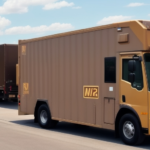Understanding Wholesale UPS Shipping Rates
Are you looking for cost-effective ways to scale your business operations and reduce your shipping costs? Wholesale UPS shipping rates may be just what you need. In this article, we’ll delve into the basics of wholesale UPS shipping rates, how they are calculated, and the various factors that affect them. We’ll also discuss the advantages of using UPS wholesale shipping services, the differences between retail and wholesale UPS shipping rates, tips for negotiating better rates, and mistakes to avoid when using wholesale UPS shipping services. Lastly, we’ll explore ways to maximize savings through bulk shipments, compare UPS rates with other carrier services, and help you track and manage your wholesale UPS shipments efficiently.
The Basics of Wholesale UPS Shipping Rates
Wholesale UPS shipping rates are designed for businesses that ship at least 100 packages per week and can save up to 70% on shipping costs compared to retail rates. These rates are based on a combination of factors, such as package weight and size, shipping distance, and delivery speed. UPS offers various shipping plans, including:
- UPS Ground
- UPS 2nd Day Air
- UPS Next Day Air
Each plan comes with different delivery times and price points, allowing businesses to choose the option that best fits their needs.
One of the key benefits of using wholesale UPS shipping rates is the ability to track packages in real-time. UPS provides a tracking number for each package, enabling you to monitor its progress from pickup to delivery. This feature is especially useful for businesses managing multiple packages simultaneously.
Additionally, wholesale UPS shipping rates offer the flexibility to customize shipping options. Businesses can add services such as signature confirmation or insurance for an additional fee, allowing them to tailor their shipping solutions to meet specific needs and provide added assurance to their customers.
How Wholesale UPS Shipping Rates are Calculated
Wholesale UPS shipping rates are calculated using a sophisticated algorithm that considers various factors:
- Package Weight and Size: Determines the dimensional weight, reflecting the package’s volume and density.
- Shipping Distance: Calculated based on the origin and destination ZIP codes.
- Delivery Speed: Faster delivery times increase the cost of the shipment.
- Additional Services: Insurance, signature confirmation, and Saturday delivery incur extra charges.
The type of package also plays a significant role in the rate calculation. For example, packages containing hazardous materials or perishable items require special handling, leading to higher shipping rates due to additional precautions and regulatory compliance.
Seasonal fluctuations can impact wholesale UPS shipping rates as well. During peak holiday seasons like Christmas and Thanksgiving, rates may rise due to increased demand. Conversely, UPS may offer discounts or promotions during slower periods to boost shipping volumes.
Factors Affecting Wholesale UPS Shipping Rates
Several factors influence wholesale UPS shipping rates, including:
- Package Weight and Size: Heavier and larger packages cost more to ship.
- Shipping Distance: Longer distances increase shipping costs.
- Delivery Speed: Expedited shipping options are more expensive.
- Fuel Surcharges: Based on fluctuating fuel prices, these surcharges can impact overall shipping costs.
- Additional Services: Fees for services like signature confirmation and insurance.
Other factors include seasonal demand, weather conditions, and global events such as wars and pandemics, which can disrupt shipping operations and affect rates.
The type of package also matters. For instance, shipping hazardous materials or fragile items requires special handling and packaging, increasing the cost. Additionally, shipping to remote locations may incur extra fees due to limited delivery options.
UPS offers various shipping options—ground, air, and international—each with its own rates and delivery times. Choosing the most appropriate option based on urgency and destination can lead to significant cost savings. Moreover, UPS provides discounts for high-volume shippers and frequent users, further reducing shipping expenses.
Advantages of Using Wholesale UPS Shipping Services
Using wholesale UPS shipping services offers numerous benefits for businesses:
- Discounted Rates: Significant savings on shipping costs, enhancing profit margins.
- Flexibility and Control: Efficient management of shipping operations with customizable options.
- Advanced Tracking and Reporting: Enhanced visibility into shipping activities through sophisticated tracking tools.
- Convenience: Easy scheduling of pickups and drop-offs, saving time and effort.
- Variety of Shipping Options: Ground, air, and international shipping to meet diverse business needs.
- Improved Customer Satisfaction: Reliable and timely deliveries boost customer loyalty and positive reviews.
Wholesale UPS shipping services also come with tools that help businesses streamline their operations, such as automated shipping systems and detailed reporting features. These tools allow for better inventory management, order tracking, and overall operational efficiency.
Differences Between Retail and Wholesale UPS Shipping Rates
The primary difference between retail and wholesale UPS shipping rates lies in the quantity of packages shipped:
- Retail Rates: Designed for businesses shipping fewer than 100 packages per week.
- Wholesale Rates: Intended for businesses shipping 100 or more packages per week.
Wholesale UPS shipping rates offer greater flexibility and customization options compared to retail rates, allowing businesses to tailor their shipping plans to their specific needs.
Another significant difference is the pricing structure:
- Retail Rates: Typically fixed and do not vary based on shipping volume.
- Wholesale Rates: Often tiered, meaning the cost per package decreases as shipping volume increases.
This tiered pricing structure can lead to substantial cost savings for businesses with high shipping volumes.
How to Choose the Right UPS Shipping Plan for Your Business Needs
Selecting the appropriate UPS shipping plan requires careful consideration of several factors:
- Shipping Volume and Frequency: Assess whether your business qualifies for wholesale rates based on your shipping volume.
- Budget: Determine your budget and choose a plan that offers the best balance between cost and delivery speed.
- Delivery Time Frames: Align your shipping plan with customer expectations for delivery times.
- Additional Services: Opt for services like insurance, signature confirmation, and Saturday delivery if they meet your business needs.
- Destination Needs: Consider international shipping requirements, such as customs clearance assistance and tracking.
- Customer Support: Choose a plan that offers dedicated customer support to address any shipping concerns.
Additionally, reviewing the terms and conditions of each shipping plan is crucial to understand all fees, restrictions, and requirements before making a final decision.
Tips for Negotiating Better Wholesale UPS Shipping Rates
Negotiating better wholesale UPS shipping rates can lead to significant savings. Here are some strategies:
- Consolidate Shipping Volumes: Streamline your package sizes and increase shipment volumes to leverage better rates.
- Negotiate Contracts: Use your shipping volume as leverage to negotiate favorable terms and commit to longer-term contracts.
- Shop Around: Compare rates with competing carriers to use as leverage in negotiations with UPS.
- Utilize Online Tools: Take advantage of UPS's online tools and services to manage shipments more efficiently and demonstrate your value as a customer.
- Build Relationships: Maintain a strong relationship with your UPS representative, keeping them informed of any changes in your shipping needs and being open to their suggestions.
By implementing these tips, you can work collaboratively with UPS to find cost-effective solutions that benefit both parties.
Common Mistakes to Avoid When Using Wholesale UPS Shipping Services
Avoiding common pitfalls can save your business time and money. Some of the most frequent mistakes include:
- Mislabeling Packages: Ensure all packages are labeled correctly to prevent shipping delays or errors.
- Underestimating Shipping Costs: Accurately calculate all shipping costs, including additional fees and surcharges.
- Failing to Optimize Package Sizes: Use appropriately sized packaging to reduce dimensional weight charges.
- Ignoring Shipping Delays: Plan for potential delays by choosing appropriate delivery speeds and communicating proactively with customers.
- Handling Packages Improperly: Ensure fragile or hazardous items are packaged according to UPS guidelines to prevent damage or compliance issues.
These mistakes can lead to increased costs, customer dissatisfaction, and lost revenue. By avoiding them, you can enhance your shipping efficiency and reliability.
Maximizing Savings on Wholesale UPS Shipping Rates through Bulk Shipment
To maximize savings on wholesale UPS shipping rates, consider the following strategies:
- Consolidate Shipments: Combine multiple smaller shipments into a single bulk shipment to benefit from lower rates.
- Optimize Package Sizes and Weights: Use the smallest possible packaging to reduce dimensional weight and overall shipping costs.
- Choose Cost-Effective Shipping Methods: Select shipping options that offer the best balance between cost and delivery speed based on your business needs.
- Negotiate Better Deals: Leverage your shipping volume to negotiate more favorable rates with UPS.
Implementing these strategies can lead to substantial cost reductions over time, especially for businesses with high shipping volumes.
Comparison of Wholesale UPS Shipping Rates with Other Carrier Services
When comparing UPS with other carrier services, consider the following factors:
- Shipping Costs: Analyze the rates offered by different carriers to determine the most cost-effective option.
- Delivery Speed: Compare delivery times to ensure they meet your business and customer requirements.
- Package Size and Weight Limitations: Ensure the carrier can handle the size and weight of your packages.
- Tracking and Reporting Tools: Evaluate the tracking capabilities and reporting features offered by each carrier.
- Global Network: Consider the carrier’s international reach if your business requires cross-border shipping.
While other carriers may offer competitive rates or specialized services, UPS stands out with its advanced tracking and reporting tools, extensive global network, and customizable shipping plans, making it a strong choice for many businesses.
Understanding Additional Fees and Surcharges on Wholesale UPS Shipping Invoices
When using wholesale UPS shipping services, it's essential to be aware of additional fees and surcharges that may appear on your invoices. Common fees include:
- Fuel Surcharges: Based on the fluctuating price of fuel, these can vary and impact overall shipping costs.
- Residential Delivery Fees: Additional charges for delivering to residential addresses.
- Address Correction Fees: Fees incurred when UPS has to correct an incomplete or inaccurate address.
- Customs Clearance Fees: Applied to international shipments requiring customs processing.
- Saturday Delivery Fees: Extra costs for weekend deliveries.
Understanding these fees can help you manage and predict your shipping expenses more accurately. To minimize unexpected costs:
- Ensure all package information is accurate and complete to avoid address correction fees.
- Plan shipments to minimize residential deliveries or choose business addresses when possible.
- Review UPS’s fee structure regularly to stay informed about any changes.
Tracking and Managing Your Wholesale UPS Shipments Efficiently
Efficiently tracking and managing your wholesale UPS shipments is crucial for maintaining operational effectiveness and customer satisfaction. Here are some strategies:
- Utilize UPS's Advanced Tracking Tools: Take advantage of UPS's tracking and reporting features to monitor your shipments in real-time.
- Implement Automated Systems: Use shipping software that integrates with UPS to automate tracking updates and notifications.
- Set Up Shipment Notifications: Enable live package updates and alerts to stay informed about the status of your shipments.
- Use Third-Party Logistics Providers: Partner with 3PLs that specialize in UPS shipping to enhance your tracking and management capabilities.
By adopting these strategies, you can streamline your shipping processes, reduce errors, and ensure timely deliveries, ultimately improving your business operations.
Benefits of Partnering with a Third-Party Logistics Provider for Your Wholesale UPS Shipments
Collaborating with a third-party logistics provider (3PL) for your wholesale UPS shipments offers several advantages:
- Expertise: Access to a team of shipping experts who understand the intricacies of UPS services and can provide valuable guidance.
- Operational Efficiency: Optimize your shipping processes, increase shipment volumes, and minimize costs through expert management.
- Value-Added Services: Benefit from additional services such as freight forwarding, warehousing, and customs clearance.
- Scalability: Easily scale your shipping operations up or down based on business needs without the overhead of managing logistics in-house.
- Technology Integration: Leverage advanced shipping technologies and software solutions provided by 3PLs to enhance tracking and management.
Partnering with a 3PL can lead to streamlined logistics operations, reduced shipping costs, and improved service quality, allowing your business to focus on core activities and growth.
Conclusion
Wholesale UPS shipping rates offer significant savings for businesses that ship in bulk. Understanding how these rates are determined, the factors that influence them, and the advantages they provide is essential for managing shipping costs effectively. By leveraging the strategies and tips outlined in this article—such as negotiating better rates, avoiding common mistakes, maximizing bulk shipment savings, and partnering with a reliable third-party logistics provider—you can optimize your shipping operations, reduce expenses, and enhance customer satisfaction. Embracing wholesale UPS shipping services not only helps in managing current shipping needs but also supports the scalability and growth of your business operations.






















